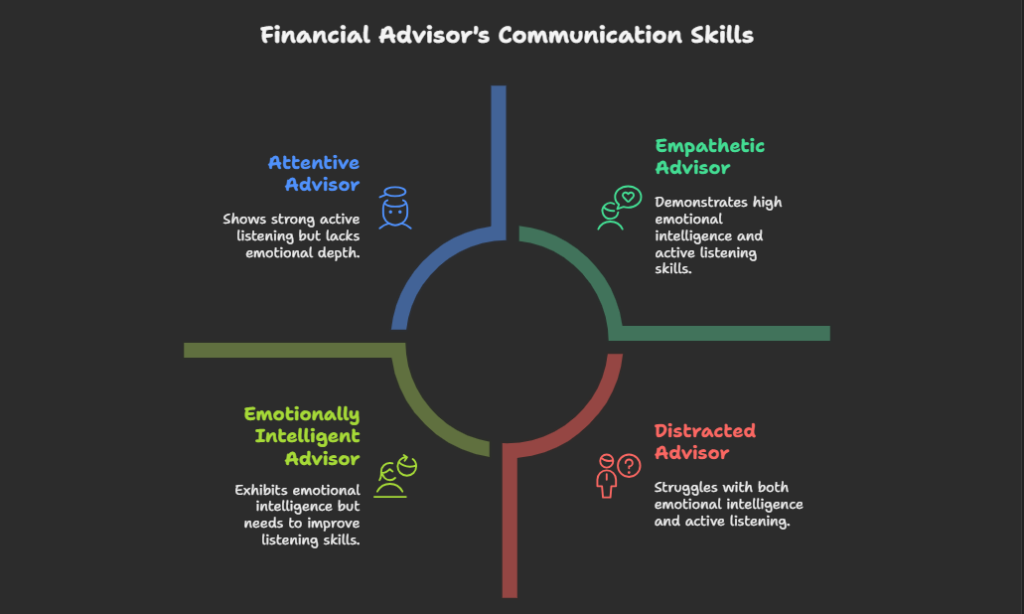What Makes a Great Financial Advisor? Find Out Now!

High-net-worth individuals often wonder what makes a great financial advisor, especially when they are entrusting significant wealth, retirement plans, or generational assets. A great advisor can blend technical expertise, emotional intelligence, and a commitment to ongoing learning. He or she will act as a guide through complex investment decisions, offering the kind of personalized care that fosters long-term relationships. People commonly ask five things about what makes a great financial advisor: whether a specialized degree is essential, how fiduciary duties are handled, what communication style they use, how success is measured, and the ways they adapt to changing markets.
Recognize Key Qualifications

A proven educational background lays a strong foundation. Most brokerage firms require at least a bachelor’s degree, typically in finance, marketing, or business, and many advisors bolster their credibility by obtaining advanced degrees like an MBA (Investopedia). Beyond academics, relevant certifications signal an advisor’s dedication to ethics and skill. For instance, the Certified Financial Planner (CFP) credential demands prior coursework, practical experience, and a code of ethics.
- Proper Licenses: Advisors who manage brokerage activities often hold the Series 7 license, while those collecting advisory fees typically clear the Series 65 exam (Investopedia). Those curious about the steps involved in licensure can explore more details at how to get financial advisor license.
- Specialized Credentials: Some professionals also pursue designations like the Certified Trust and Fiduciary Advisor, which further establishes expertise in estate and trust matters. Learn more at certified trust and fiduciary advisor.
Look for Ongoing Training
Great advisors remain students of the field. They take active steps to refresh their knowledge about market dynamics, regulatory mandates, and new technologies. Firms such as Edward Jones offer in-depth training programs with study materials and workshops to keep advisors at the top of their game (Edward Jones). Advisors who commit to continuous education are better equipped to help clients adapt to evolving market conditions or regulatory shifts.
- Market Awareness: Top-tier advisors regularly monitor economic trends, invest in research tools, and participate in conferences or webinars, ensuring they make informed recommendations (Research Optimus).
- Tech Savviness: As finance goes increasingly digital, advisors use planning software, social media, and app-based services to create a smoother client experience (eMoneyAdvisor).

Assess Core Soft Skills
Beyond licenses and credentials, outstanding financial advisors excel at listening, empathizing, and guiding their clients. Several fields—including healthcare, education, and sales—have produced many successful advisors who bring their people-focused background into the role (Edward Jones).
- Empathy and Active Listening: Advisors who genuinely seek to understand a client’s life circumstances and goals will offer guidance that feels personalized. Such empathy fosters the trust necessary for open dialogue, which is key to portfolio success.
- Communication Style: Great advisors break down complicated terms into digestible information. For individuals or families with large portfolios, clarity is crucial. To discuss conversation points with your advisor, take a look at things to ask your financial advisor.
Stay Adaptable and Informed
Financial markets shift rapidly, meaning a great advisor must stay nimble. They remain proactive in monitoring economic factors that affect portfolio performance and explore emerging opportunities or risk factors. Advisors also need to understand how to incorporate advanced approaches like AI-driven analytics for hyper-personalized strategies (Independent Advisor Alliance).
- Regulatory Compliance: Strong advisors monitor changing regulations and invest in compliance solutions, ensuring they protect both their firm and their clients (Research Optimus).
- ESG Considerations: With growing demand for Environmental, Social, and Governance (ESG) investments, many advisors are learning how to align portfolios with sustainability goals or personal values (Independent Advisor Alliance).
Emphasize Personalization and Fiduciary Duty

Above all, a great financial advisor demonstrates steadfast integrity. Acting in a fiduciary capacity means placing a client’s best interests ahead of personal gain. This reduces conflicts of interest and builds deeper trust. Some wonder, “Is it worth it to have a financial advisor?” For individuals managing substantial assets or complex finances, the fiduciary approach can guard wealth and offer confidence over the long haul. More insights are available at is it worth it to have a financial advisor.
- Honest Fee Structures: Advisors committed to fairness avoid excessively high fees or pushing unnecessary products. Their focus is on helping clients thrive financially (Investopedia).
- Deep Client Understanding: Great advisors ask the right questions to uncover a client’s aspirations, risk tolerance, and lifestyle preferences. This leads to individualized strategies and fosters enduring advisor-client relationships.
Consider Outsourcing and Scalability
Many top advisors optimize time and resources by outsourcing certain functions, such as specialized research. This way, they can concentrate on the relationship-building and portfolio planning that directly benefit clients (Research Optimus).
- Handling Growth: As an advisor’s client base expands, outsourcing helps maintain consistent service. For instance, 77% of top advisory teams ensure staff members can step into multiple roles, reducing disruptions if key personnel are unavailable (LPL Financial).
- Selective Clientele: Serving too many non-ideal clients can dilute an advisor’s efforts. High-net-worth individuals might prefer advisors who prioritize personalized service, leading to better long-term outcomes.
Summarize Key Takeaways
Deciding on a financial advisor can feel like choosing a steady partner for the future. So, what makes a great financial advisor truly stand out? It involves tangible credentials, empathetic communication skills, flexibility in evolving markets, and above all, an unwavering focus on ethical service. Individuals who want more concrete steps to begin searching can refer to choosing a financial advisor for further guidance.
A well-credentialed, forward-thinking, and empathetic advisor can offer a high-net-worth family the clarity and peace of mind they deserve. By examining qualifications, assessing soft skills, and ensuring the advisor prioritizes the client’s best interest, investors can build a strong, lasting partnership that supports their financial vision.
Recent Posts
Financial Advisors in Los Angeles to Consider
Finding the right financial advisor can be a pivotal step...
Financial Advisors in New York to Consider
Selecting the right financial advisors in New York can play...





